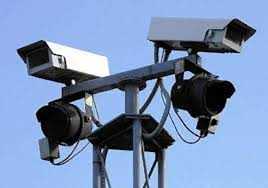
Many tier security arrangements have been made including the deployment of hi-tech gadgetry along the routes leading to the south Kashmir cave shrine to ensure smooth and peaceful conduct of annual Amarnath yatra, which begins on July 3.
For the first time, facial recognition systems (FRS) have been installed at strategic locations on both the Pahalgam and Baltal routes of Amarnath Yatra, officials said.
The FRS, which has been fed the images of active terrorists and suspected OGWs, alerts security forces on a real-time basis in case any blacklisted person comes into the frame of the surveillance cameras.
“As soon as any of the blacklisted persons walks into the frame, a hooter will go off at the surveillance centre manned by security forces so that steps to eliminate threat can be initiated in real time,” said the official.
The entire yatra routes passing through valley have been declared as “no fly zones” as authorities have banned the use of any UAVs or drones in these areas from July 1 to August 10.
The annual pilgrimage to the cave shrine in south Kashmir Himalayas starts on July 3 and will culminate on August 9 to coincide with Raksha Bandhan.
The duration of the Yatra has been reduced to 38 days this year.
The authorities are not taking any chance and have bolstered security with several other measures afte the April 22 Pahalgam terror attack.
All vehicles plying on the routes and individual pilgrims will be tagged with radio frequency identification technology, which will help in monitoring their movement.
The entire route from Jammu to the cave has been brought under CCTV surveillance, and a three-tier security blanket has been thrown around all the base camps, officials said.
A large number of police and paramilitary personnel have been deployed for static guard duty along the Jammu-Srinagar highway.
The deployment of security personnel has also been carried out at some vulnerable spots on link roads connecting with the highway.
Random checking of vehicles is being done from dawn till late at night to ensure that no hostile element is able to breach the security arrangements, a senior police official said.
Many tier security arrangements have been made including the deployment of hi-tech gadgetry along the routes leading to the south Kashmir cave shrine to ensure smooth and peaceful conduct of annual Amarnath yatra, which begins on July 3.
For the first time, facial recognition systems (FRS) have been installed at strategic locations on both the Pahalgam and Baltal routes of Amarnath Yatra, officials said.
The FRS, which has been fed the images of active terrorists and suspected OGWs, alerts security forces on a real-time basis in case any blacklisted person comes into the frame of the surveillance cameras.
“As soon as any of the blacklisted persons walks into the frame, a hooter will go off at the surveillance centre manned by security forces so that steps to eliminate threat can be initiated in real time,” said the official.
The entire yatra routes passing through valley have been declared as “no fly zones” as authorities have banned the use of any UAVs or drones in these areas from July 1 to August 10.
The annual pilgrimage to the cave shrine in south Kashmir Himalayas starts on July 3 and will culminate on August 9 to coincide with Raksha Bandhan.
The duration of the Yatra has been reduced to 38 days this year.
The authorities are not taking any chance and have bolstered security with several other measures afte the April 22 Pahalgam terror attack.
All vehicles plying on the routes and individual pilgrims will be tagged with radio frequency identification technology, which will help in monitoring their movement.
The entire route from Jammu to the cave has been brought under CCTV surveillance, and a three-tier security blanket has been thrown around all the base camps, officials said.
A large number of police and paramilitary personnel have been deployed for static guard duty along the Jammu-Srinagar highway.
The deployment of security personnel has also been carried out at some vulnerable spots on link roads connecting with the highway.
Random checking of vehicles is being done from dawn till late at night to ensure that no hostile element is able to breach the security arrangements, a senior police official said.
© Copyright 2023 brighterkashmir.com All Rights Reserved. Quantum Technologies